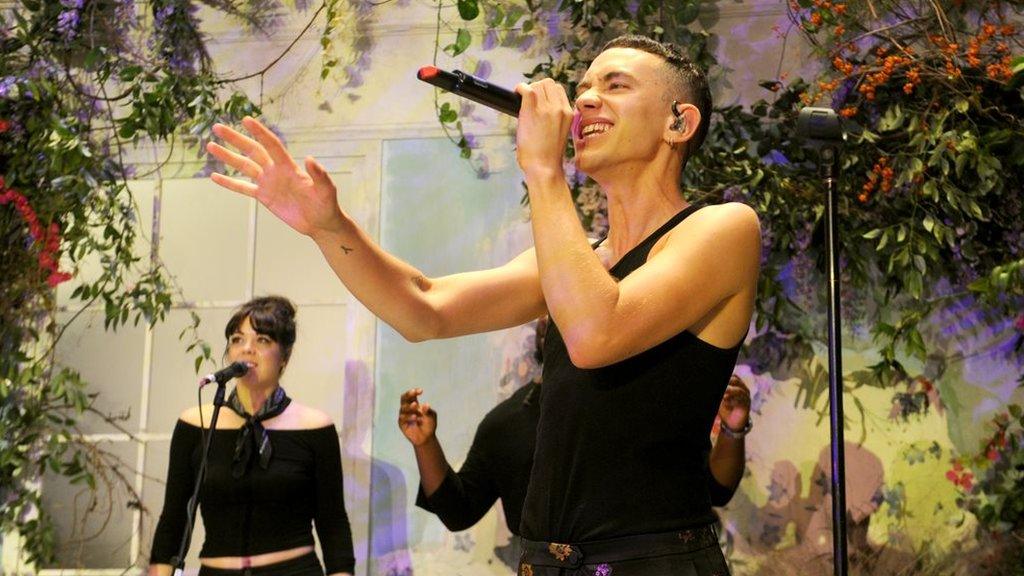Russell T Davies on It's A Sin: 'We were all Aids deniers - then it got real'
- Published

Singer and actor Olly Alexander (front) leads the cast of Channel 4's It's A Sin
For Queer As Folk and Doctor Who writer Russell T Davies, being gay in the 1980s meant enjoying new freedoms while also living in fear of Aids. He has now poured those experiences into his latest TV drama.
When 18-year-old Davies went to Oxford University in 1981, some friends from back home in south Wales moved to London to be actors.
As he studied English in the echoing halls of Worcester College, they had non-stop house parties in the Pink Palace. They had more fun.
"A lot of my friends from our local youth theatre in Swansea went off to become actors, lived in a flat called the Pink Palace, had parties night and day," Davies recalls.
"So on a lot of weekends, I used to disappear and visit the Pink Palace. Sit on that train, and get the train back with a hangover."
Davies is now one of the UK's best-loved TV dramatists, thanks to shows like Queer As Folk, Doctor Who, Cucumber, A Very English Scandal and Years and Years.
But he remembers the parties, the Pink Palace and the people who lived there fondly. So fondly that he has put them at the heart of his new Channel 4 show.
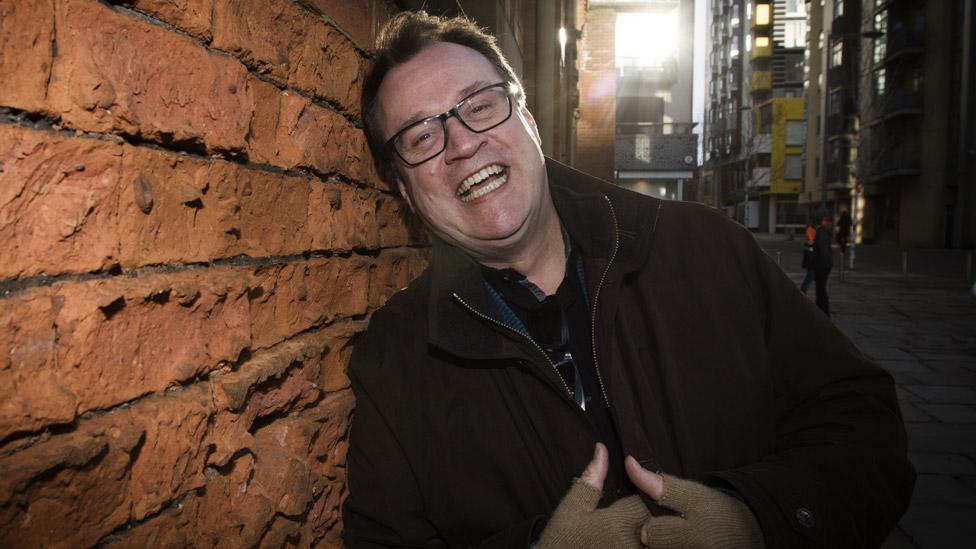
Davies says the "scenes of paranoia and fear and overreaction and lack of reaction" resonate amid the current pandemic
It's A Sin revolves around a group of young gay friends who attempt to throw off the shackles of their parents' generation to live their best, most liberated, most hedonistic lives.
Life in the TV version of the Pink Palace is wild (one particularly epic montage is soundtracked by a disco remix of the William Tell Overture). Surely the parties have been exaggerated for dramatic effect?
"Oh God no," Davies replies. "We started having those parties back in Swansea in the summer we were 18. Everyone's parents went away on holiday in that summer. We had a party that lasted for three weeks. Three weeks!
"We just rolled from house to house to house. What I've put on screen is nothing compared to what we got up to. Nothing!
'It's about being free'
"Of course you don't live like that all the time. But here I am 40 years later remembering that Pink Palace and loving it, so it was incredible. It was an amazing place to go.
"And of course it's not just about who you're boozing with. It's not just about who you're sleeping with. It's about being free. It's about being open and gay, or whatever sexuality you were in that flat. Finding yourself and being absolutely open and loud about it.
"So it was actually very important. The parties were the least important thing, and the life being lived was much more vital."

Ash (Nathaniel Curtis, left) and Ritchie (Olly Alexander) in the Pink Palace
While the good times are shown on screen, via Davies' rose-tinted glasses, there is a dark cloud on the horizon.
There are whispers in the Pink Palace about a mysterious disease that mainly seems to be killing gay men. The residents are in denial at first - especially main character Ritchie, played by Olly Alexander, best known as the frontman of pop group Years and Years.
The disease was Aids. Davies says he wanted to fill in part of the Aids story that some other dramas have left out.
"That's episode two, where we were all debunking it," the writer says. In one scene, which has been used as a trailer, external, Ritchie rubbishes the idea of an illness affecting gay men ("What about bisexuals? Do they only get sick every other day?") and airs some of the theories behind it - reminding us that dangerous misinformation did not come along with the internet.
"Ritchie thinks that HIV was created in Russia, created by a laboratory, sent by God, all those stories," Davies says. "They were there in the 1980s with no internet to spread it. We're just mad. The human race has such a battle with its own intelligence."
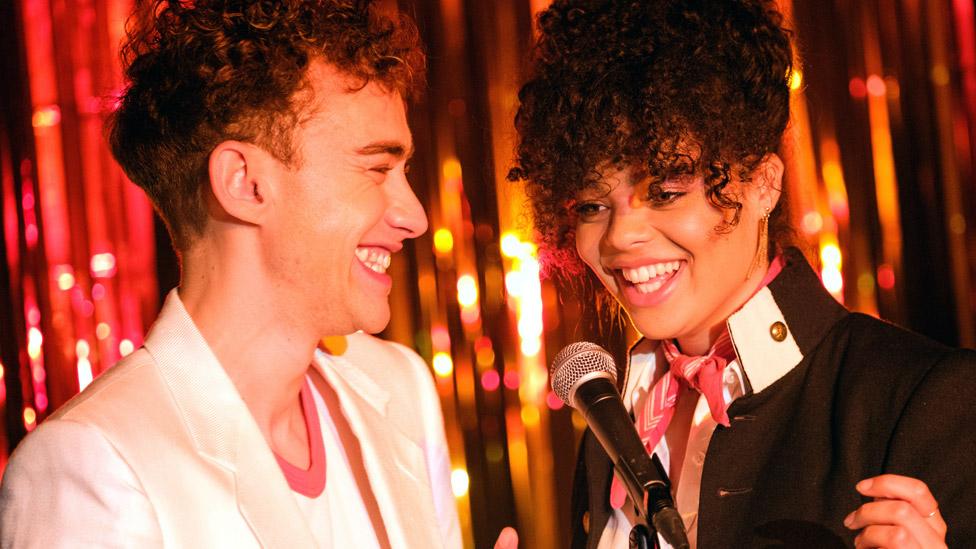
Lydia West (right) plays Ritchie's friend Jill, named after a real friend of Davies
Davies has seen Ritchie being called an Aids denier thanks to that clip. "You think, no, the point is, we all were. He's representing everyone who said that.
"Activists, people who were ahead of the game, tried to leave information in pubs. They'd leave leaflets, and landlords would throw them out. Gay landlords would throw them out of gay pubs, thinking they were trying to scare people, thinking they were trying to stop sex, thinking it was an anti-gay movement.
"So it was a really powerful thing. That's why I'm delighted that I got to write episode two because that's the point of that episode, the denial. And then they all very quickly learned that it is a true thing."
Ritchie isn't directly based on Davies himself, but the writer says the characters' unfolding realisation about the HIV virus and Aids reflects "how much attention I paid to it - which was none at first".

Keeley Hawes appears as Ritchie's mother
"It did start like a strange rumour on the horizon. It started as something American. We felt very distant. It literally felt like it got closer and closer and closer, until it was on your doorstep, until it was taking away people you loved.
"Eventually, simply - it must have been around the mid- to late-80s - you know someone who's got it and dies."
The five-part drama also powerfully conveys how ignorance, fear and shame largely dominated the response among the authorities and in wider society, especially in the early days.
The world is now dealing with a very different type of virus. While It's A Sin was filmed before the Covid-19 pandemic, it has eerie echoes, Davies says.
"It was genuinely strange to see we put in scenes of PPE and isolation and distancing, and scenes of paranoia and fear and overreaction and lack of reaction," he says. "History just repeats itself. Here we are going through the same thing again. And we will go through the same thing later."
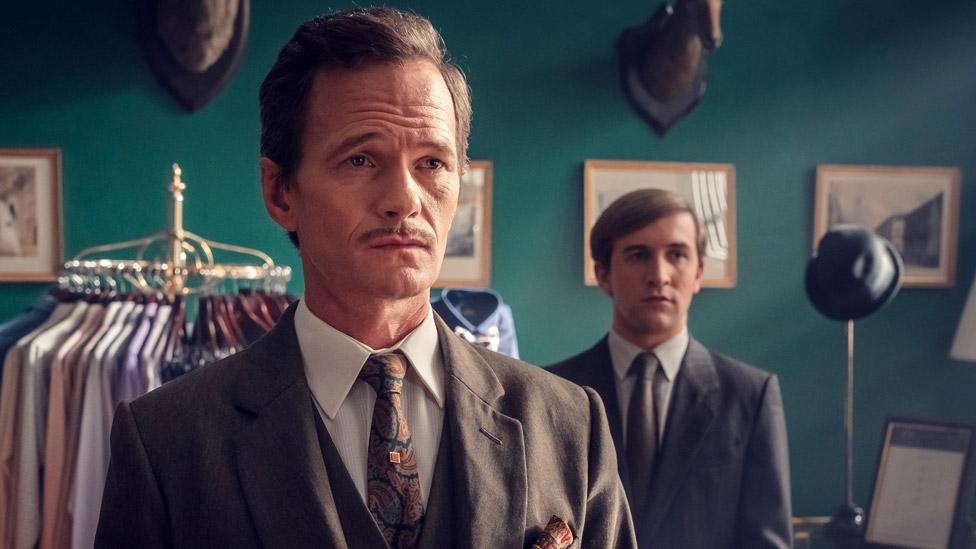
Neil Patrick Harris (left) plays a Savile Row tailor
It's A Sin features glorious supporting performances from Neil Patrick Harris as a Savile Row tailor, Stephen Fry as a Conservative MP and Keeley Hawes as Ritchie's mum. It also includes a brilliant nod to Davies' stint as the man who resurrected and reinvented Doctor Who in 2005.
By his own admission, he now writes "a lot of gay drama". The gay community now "have a bit more of a voice" than they did in the 80s. But that voice cannot be taken for granted, he says.
"With every gay drama, I sit here absolutely convinced that the rights that we have are paper thin and could be lost at any moment," Davies says, citing Home Secretary Priti Patel's vote against same-sex marriage in 2013.
"So don't tell me that we can relax on any laws, any freedoms that we have, any liberty. We have to be absolutely vigilant all the time."
'The memories are going'
Davies will continue giving the LGBT community a voice - even if, in Ritchie's case, that voice is misleading at first.
Another reason for writing It's A Sin was simply to remember those friends who died of Aids. Most of them didn't have children, and their older relatives are now dying out.
"We're reaching a stage when the parents are going and so the memories are going," he says.
"That's one of the reasons why this needs telling now. Before it passes into history, while it's still there in memory. Just a nice little chance to preserve it for a moment, hold it there and salute them."
It's A Sin begins on Channel 4 on Friday 22 January and will then be available on All4.

Follow us on Facebook, external or on Twitter @BBCNewsEnts, external. If you have a story suggestion email entertainment.news@bbc.co.uk, external.
Related topics
- Published3 November 2019
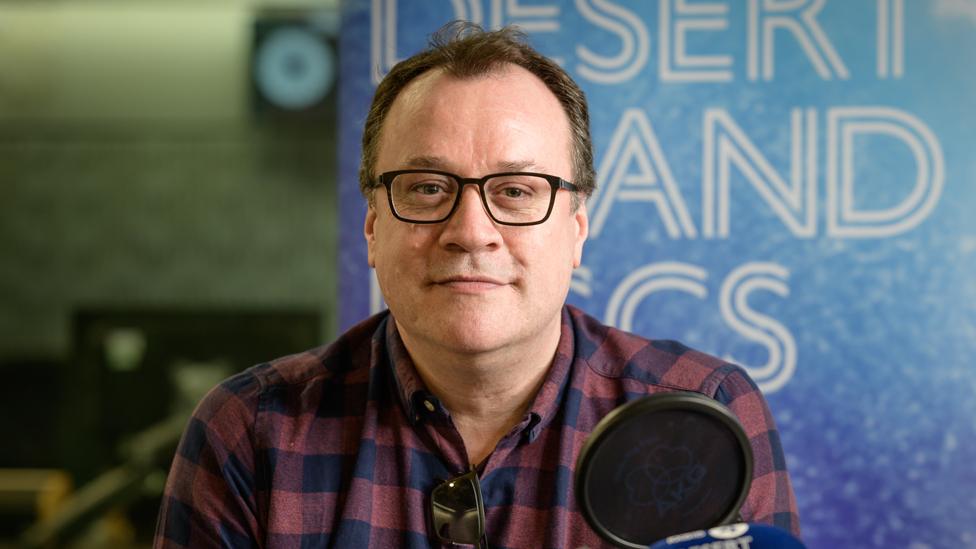
- Published4 October 2019

- Published19 March 2018
